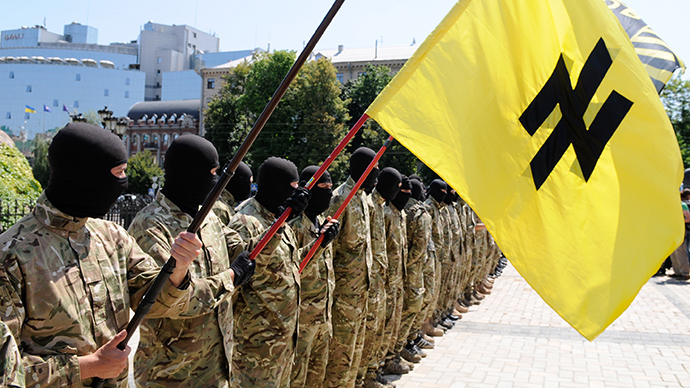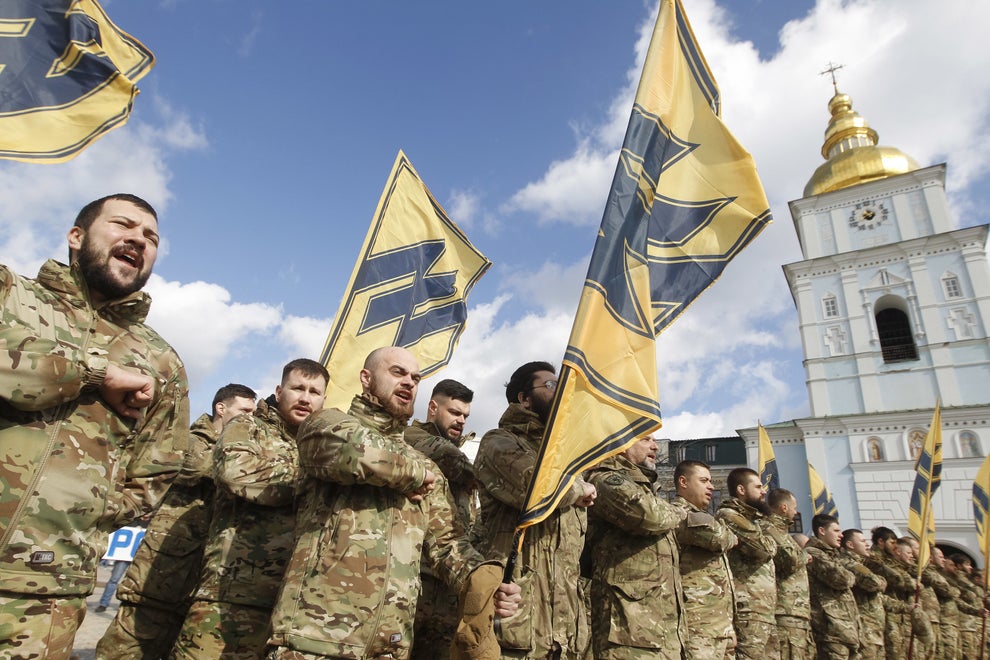Greek in Mariupol Says ‘Fascist Ukrainians Would Kill Me, They Don’t Let Us Leave the City’


Orinoco Tribune – News and opinion pieces about Venezuela and beyond
From Venezuela and made by Venezuelan Chavistas

With Russian forces besieging Mariupol, in which more than 120,000 ethnic Greeks live, SKAI news spoke with a Mr. Kiouranas who lives in the city. He revealed that Ukrainian fascists are killing people for trying to leave the city.
Φωνάζει ο Οικονόμου στον #skai_xeftiles για την προπαγάνδα των Ρωσικών μέσων ενημέρωσης και ξαφνικά εδώ κατάπιε την γλώσσα του….. !!!!!#σκαι_ξεφτιλες#Ουκρανια pic.twitter.com/EHsUorltaE
— th_eo (@theocha52630506) February 28, 2022
When asked by SKAI news if he planned to leave the city, Kiouranas responded “how can I leave? When you try to leave you run the risk of running into a patrol of the Ukrainian fascists, the Azov Battalion.”
“They would kill me and are responsible for everything,” he added.
RELATED CONTENT: Western Media Fall in Lockstep for Neo-Nazi Publicity Stunt in Ukraine
Who are the Azov Battalion?
Azov Special Operations Detachment (Ukrainian: Окремий загін спеціального призначення «Азов»), or Azov Battalion, is a right-wing extremist and neo-Nazi unit of the National Guard of Ukraine, based in Mariupol, in the Azov Sea coastal region.
In 2014, the regiment gained notoriety after allegations emerged of torture and war crimes, as well as neo-Nazi sympathies and usage of associated symbols by the regiment itself, as seen in their logo featuring the Wolfsangel, one of the original symbols used by the 2nd SS Panzer Division Das Reich.
Representatives of the Azov Battalion say that the symbol is an abbreviation for the slogan Ідея Нації (Ukrainian for “National Idea”) and deny connection with Nazism.
In 2014, a spokesman for the regiment said around 10–20% of the unit were neo-Nazis.
In 2018, a provision in an appropriations bill passed by the U.S. Congress blocked military aid to Azov on the grounds of its white supremacist ideology; in 2015, a similar ban on aid to the group was overturned by the Congress.
Members of the regiment come from 22 countries and are of various backgrounds.

More than half of the regiment’s members speak Russian and come from eastern Ukraine, including cities of Donetsk and Luhansk.
The unit’s first commander was far-right nationalist Andriy Biletsky, who led the neo-Nazi Social-National Assembly and Patriot of Ukraine.
In its early days, Azov was a special police company of the Ministry of Internal Affairs, led by Volodymyr Shpara, the leader of the Vasylkiv, Kyiv, branch of Patriot of Ukraine and Right Sector.
In 2018, the U.S. House of Representatives also passed a provision blocking any training of Azov members by American forces, citing its neo-Nazi connections.
The House had previously passed amendments banning support of Azov between 2014 and 2017, but due to pressure from The Pentagon, the amendments were quietly lifted.
This was protested by the Simon Wiesenthal Center which stated that lifting the ban highlighted the danger of Holocaust distortion in Ukraine.
“Of course not, it’s all made up, there are just a lot of people who are interested in Nordic mythology,” said one fighter when asked by The Guardian in 2014 if there were neo-Nazis in the battalion.
When asked what his own political views were, however, he said “national socialist”. As for the swastika tattoos on at least one man seen at the Azov base, “the swastika has nothing to do with the Nazis, it was an ancient sun symbol,” he claimed.
The battalion has drawn far-right volunteers from abroad, such as Mikael Skillt, a 37-year-old Swede, trained as a sniper in the Swedish army, who described himself as an “ethnic nationalist” and fights on the front line with the battalion.

Another speaking to The Guardian, Dmitry, said “I have nothing against Russian nationalists, or a great Russia. But Putin’s not even a Russian. Putin’s a Jew.”
Dmitry claimed not to be a Nazi, but waxed lyrical about Adolf Hitler as a military leader, and believes the Holocaust never happened.
Not everyone in the Azov battalion thinks like Dmitry, but after speaking with dozens of its fighters and embedding on several missions during the past week in and around the strategic port city of Mariupol, the Guardian found many of them to have disturbing political views, and almost all to be intent on “bringing the fight to Kiev” when the war in the east is over.
Featured image: Azov Battalion.
Support Orinoco Tribune team’s unique, amazing, and unmatched work!
5.5 years providing honest and responsible anti-imperialist information about the Global South!
66 months working for you, 18.5K posts published, 60 original pieces in the last 4 months, 21 YouTube interviews over the last 12 months, and much more to come!
Your donations make a big difference!